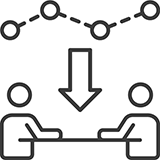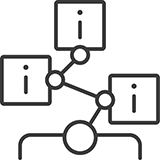The project identified eight key driving forces deemed to substantially influence the development of the two analysed types of platform work by 2030: technology, the labour market, consumer protection, labour regulation, sector regulation, information obligations relating to tax and social insurance authorities, platform ownership/governance, and platform business models. Based on assumed developments of these driving forces, 10 possible future scenarios were derived.
Technology
Technology develops quickly, fostered in part by EU and national initiatives in the digital era. For example, EU, national and regional funding programmes supporting innovation, notably related to the development and deployment of technologies, are increased and efforts to make them accessible and effective for research and business are taken.
5G mobile technology, the Internet of Things (IoT), robotics, electronic and autonomous vehicles, 3D printing, and augmented and virtual reality have reached a level of technological and market maturity that allows for their widespread deployment in the economy and society. Interconnectivity between technologies as well as competencies and capacities to develop and implement algorithms, data storage and data analytics have developed and are widespread. This increases the use of and demand for platform work, the clientele of which is now not only private individuals and households, but also a large share of businesses using platforms as a tool in their work organisation (outsourcing).
At the same time, demand for some services mediated through platforms decreases, including transport services that can be provided by autonomous vehicles (platform-determined work), and household services that can be done by robots or by the individuals themselves assisted by 3D-printed parts and augmented and virtual reality (worker-initiated work). From a supply-side perspective, the advances in electric bikes and virtual reality facilitate platform work for a larger group of workers: electric bikes enable less physically fit people to engage in platform-determined work, and virtual reality enriches skills development in worker-initiated platform work.
Labour market
In spite of demographic trends reducing the working age population, the European economy and labour market are characterised by a surplus of labour supply. This is driven by economic developments – a lagging recovery from labour market shocks like the long-term effect of the COVID-19 pandemic – combined with technological developments. Basic routine tasks are widely automated and require diminishing human input, both in the traditional and the platform economy. Technology has developed to also make it affordable for companies to replace workers for some medium-skilled tasks. As a result, labour demand – except for high-skilled profiles – is shrinking, and the supply of traditional employment for low-skilled, and partly also medium-skilled, workers is below demand. Accordingly, workers are increasingly looking for alternative employment and are willing (or forced) to accept it in spite of lower employment and job quality.
A downward spiral in employment and working conditions has started, with growing risk of an increase in the number of working poor and unemployed. Demand for platform work is increasing, while offers related to platform-determined and worker-initiated work are stable or decreasing. Such a development further enhances the clout of platforms (and their clients), as the supply of labour exceeds demand and workers are easily replaceable. The result is a further deterioration of the employment and working conditions of platform workers.
The political agenda strongly focuses on the digital agenda, including the digital economy’s labour market and social impacts. Due to the opportunities and challenges related to platform work, the EU and Member States commit to regulate it. The aim is to capitalise on the potential merits while safeguarding standards developed over previous decades in the traditional economy.
Consumer protection
Accordingly, EU-level regulation requires platforms to inform clients about the status of the worker (professional as opposed to non-professional service provider) so that clients know who is liable in case of an incident. This enhanced transparency, and hence security, is expected to positively influence clients’ (private individuals and households) willingness to use platform work.
Peer-to-peer providers will consider offering additional insurance as an incentive for clients to assign them tasks, in an effort to remain competitive in a market with a growing number of platform workers. The insurance sector will benefit from offering specific packages for platform workers. However, due to this enhanced competition, the additional costs arising from such insurance cannot be passed on to the client, burdening the earnings of the workers and risking an increased number of working poor.
Labour regulation
While the employment status of platform workers (that is, whether they are employees or self-employed) remains unclear, the EU establishes a common approach of minimum labour standards for all, including social protection and access to representation. This means that platform workers benefit from the same minimum standards and protections as workers in the traditional economy, for example related to accident, sickness, unemployment and pension insurance; payment at market prices; and health and safety. However, employment law tends to set higher standards and protections for employees. Hence, while the situation of self-employed improves, they continue to bear a higher level of responsibility for their own labour conditions. As it is likely that the majority of platform workers continue to be considered to be self-employed, this development is more beneficial for the worker-initiated type (whose workers tend more to be genuine self-employed) than for the platform-determined type (where the risk of misclassification of employment status is higher).
The responsibility for ensuring the minimum labour standards rests with the platforms, adding to their administrative and financial burden. Platforms will seek ways to pass on this burden to clients, for example by increasing matching fees. This will increase competition among platforms and means that those offering the most attractive services to clients will benefit. This triggers innovation in the business models of platforms and a healthier market situation in the platform economy.
Sector regulation
Another regulatory clarification is that of the sector attribution of platforms, where a specific trade regulation for platforms is defined: ‘matching services’. This takes into account the particularities of this business model and employment form, as well as its competitive position regarding related sectors in the traditional economy – for example, temporary work agencies, transport (in the case of platform-determined work) and construction (in the case of worker-initiated work).
This sector regulation sets clear standards for entering and doing business in the platform economy and considers the impact of these standards on the traditional economy and society. This not only helps to level the playing field for actors within the platform economy and between the platform and the traditional economies, but also avoids negative societal effects thanks to transparent and clear standards. Furthermore, the clear attribution of platforms to a specific sector fosters social dialogue and collective bargaining. Representation of platform workers becomes stronger, and effective negotiations between workers and platforms, or among their representatives, take place.
Information obligations regarding tax and social insurance
At the EU level, platforms are subject to the same obligations to report tax and social insurance information, with enforcement regulated and performed at national level. Workers and clients are informed about this fact and must agree to collection and use of their data before entering business with the platform.
Platform ownership and governance
The unfavourable economic and labour market developments in combination with platforms’ need to look for innovative business models to remain competitive fosters the growth of new platform business models that are oriented towards creating stakeholder value rather than shareholder value. This is also enhanced by EU and national support for socially oriented platform work, for example related to social work and homecare of older people and people with disabilities. Also, the fast technological development benefits this business model: robotics could facilitate performance of these tasks; or IoT and better interconnectivity of technologies could allow for better communication and quicker adaptation in case of unforeseen events or needs. These platform types tend to be publicly owned or run as cooperatives or non-profit organisations. Accordingly, making a quick and high profit is not the motivation of such platforms. Rather, they serve a double objective – providing needed services at reasonable cost and quality (taking into consideration demographic change and the availability of public funds to provide services of general interest) while offering employment opportunities (against the unfavourable economic and labour market situation).
In the medium to long term, this could result in reputational effects and rising expectations of clients, who will behave more critically when choosing which platforms to work with (including for ‘traditional’ platform tasks) and prefer those that act more responsibly towards society and workers.
Platform business model
Encouraged by these developments, the platform economy will expand further, and online labour platforms will diversify their fields of activity. For example, platform-determined tasks expand beyond food delivery to the delivery of goods, including parcel and mail delivery; worker-initiated tasks are offered for additional types of household services, including care and personal services. Business models diversify, with profits not the sole objective of some platform types, and ownership expands beyond private investors; that is, the platform economy is also increasingly providing services of public interest.
Consumers will get more familiar with services mediated through platforms, resulting in increased acceptance and more competition with similar services in the traditional economy. Workers find more tasks on offer through platforms, hence increasing the potential to earn income through platform work; at the same time, jobs in the traditional economy might decrease due to the competition from platforms.










